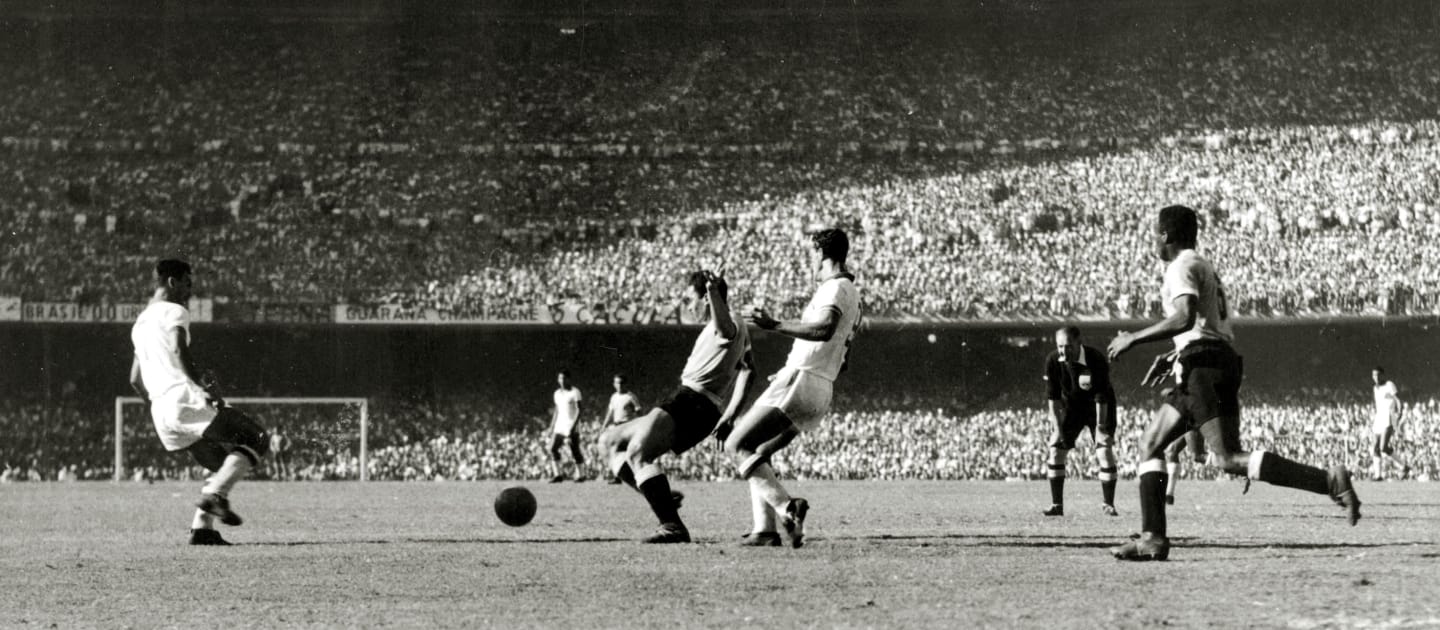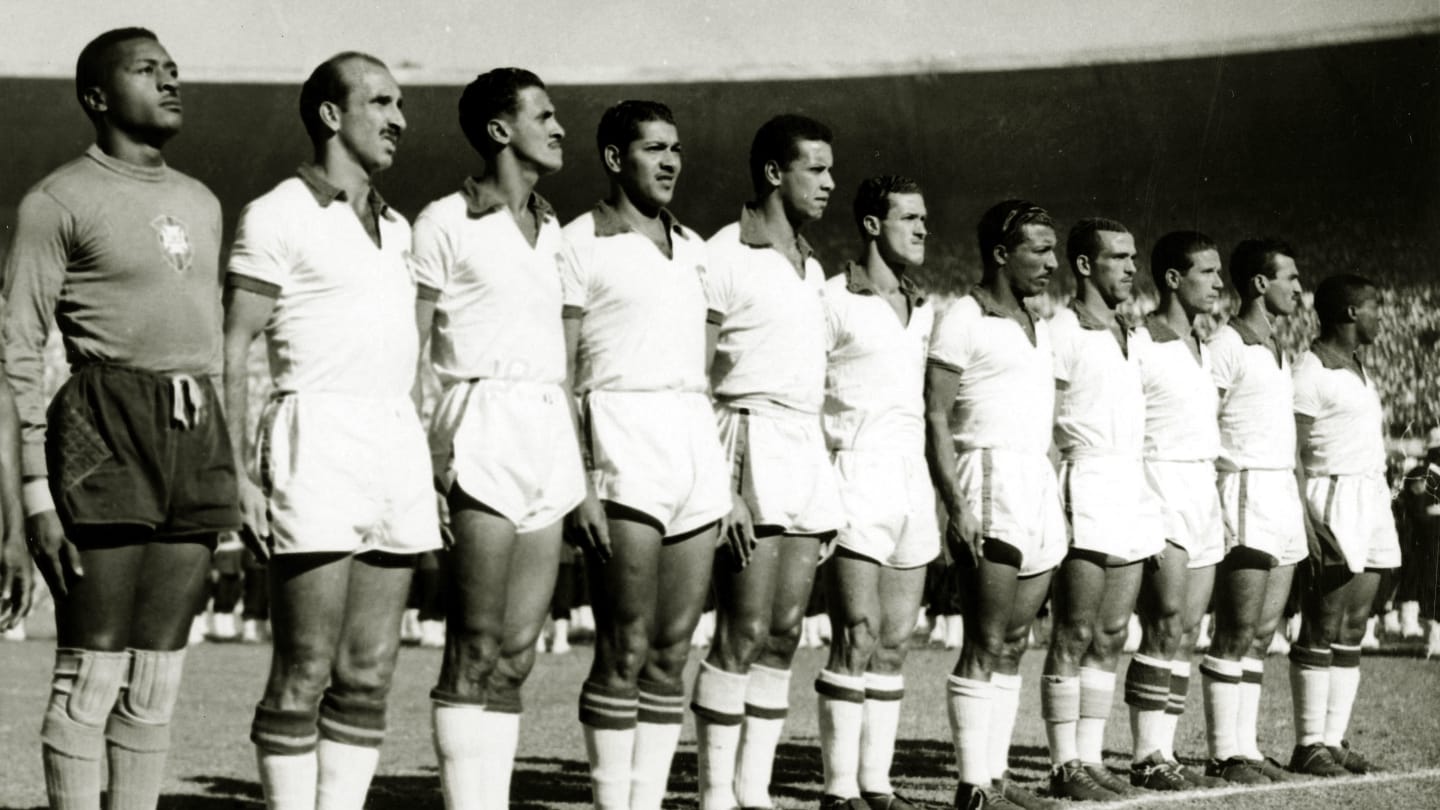Ademir Menezes é destaque no site da Fifa
Quarta-feira, 24/06/2020 - 22:43
Recife's tropical waters render it a sanctuary for sharks. And accordingly, ‘The Brazilian Venice' gave birth to one of the deadliest predators in history.
He was known as Queixada (Jaw), but not due to analogy with the subject of Steven Spielberg's blockbuster film, Jaws. For this predator, so nicknamed because of his protruding chin bone, took his prey on grass rather than in water. His name was Ademir de Menezes. His victims were opponents of Sport, Vasco da Gama, Fluminense and Brazil during an exceptional, innovative career that spanned from 1938 until '56.
Ademir was Brazilian football's first ponta de lança, a forward with a green card to roam; he forced teams to abandon the three-defender system in favour of a back four designed to negate his output; he headlined the greatest team in Vasco da Gama's illustrious history – one that became the maiden South American champions in 1948; he hit a hat-trick in a 7-0 thumping of Paraguay that seized Brazil their first Copa America trophy in 15 editions in 1949; and he finished as the leading marksman at the following year's FIFA World Cup™.
Inequitably, though, the best-remembered match in which the striker was involved ended in national disaster in the latter tournament: an unforeseen 2-1 defeat by Uruguay that cost A Seleção the Trophy on home soil.
"If Brazil had won that match, Ademir would be recognised as one of the greatest players in history," said Flavio Costa, who coached the serial goal-getter on that occasion and at Vasco."
Born on 8 November 1922, Ademir flirted with following a professional path in medicine before turning pro with regional giants Sport in 1941 and scoring an unparalleled 11 goals to inspire them to the state title in his debut season. The catalyst in his relocation to Rio de Janeiro was, however, an electrifying performance against his would-be employers in a 1942 friendly, an Ademir hat-trick propelling Sport from a three-goal deficit to a 4-3 win over Vasco.
Ademir instantly stood out physically at the Sao Januario: he was lanky, had an extruding chin and dark, fastidiously slicked-back hair, and sported a pencil-thin moustache. And despite cohabiting a training ground with epochal greats, he was equally conspicuous in footballing terms, blessed with supersonic speed, skilful, formidable in the air and boasting considerable power in both feet.
Those traits helped Vasco end a nine-year wait for Campeonato Carioca gold in 1945, with an Ademir brace inspiring a crown-clinching 4-0 reverse of Madureira in the penultimate round. It prompted Gentil Cardoso to make a plea to the Fluminense board: "Give me Ademir and I'll give you the title."
O Tricolor duly parted with an exorbitant fee to bow to their coach's whim. His vow was swiftly realised. Queixada's stay at the Laranjeiras was abrupt but auspicious. As well as that state championship conquest, he bagged 64 goals in 77 games before regret over his divorce from Vasco became intolerable.
In 1948 the marriage was back on. Within months Expresso da Vitória (Victory Express), an enchanting side including Brazil internationals Barbosa, Augusto, Ely, Friaca, Danilo, Maneca and Chico, had become the inaugural South American champions in a seven-team, round-robin tournament in Chile.
Injury ruled Ademir out of the title-securing 0-0 draw with a River Plate side comprising Alfredo Di Stefano, Jose Manuel Moreno, Angel Labruna and Felix Loustau, but by then he had put Vasco en route to glory with a memorable performance in a 4-1 reverse of tournament favourites Nacional. "Ademir terrorised us that day," recalled legendary Uruguayan defender Schubert Gambetta.
Most goals in one World Cup
| Player | Team | Goals | Games | Year |
|---|---|---|---|---|
| Just Fontaine | France | 13 | 6 | 1958 |
| Sandor Kocsis | Hungary | 11 | 5 | 1954 |
| Gerd Muller | West Germany | 10 | 6 | 1970 |
| Eusebio | Portugal | 9 | 6 | 1966 |
| Guillermo Stabile | Argentina | 8 | 4 | 1930 |
| Ademir | Brazil | 8 | 6 | 1950 |
| Ronaldo | Brazil | 8 | 7 | 2002 |
Gambetta and Co would nevertheless avenge that defeat two years later in a disastrous conclusion to what had, hitherto, an outstanding World Cup for Ademir and a revered Brazil side also featuring Danilo, Jair and the magical Zizinho. He struck eight goals – including the very first at the Maracana – as Brazil waltzed into what was effectively a decider against Uruguay requiring only a draw. What ensued was the stuff of Brazilian nightmare, La Celeste recovering a deficit to devastate an entire nation.
It was the nadir of what was otherwise a magnificent eight years in the camisa canarinha. Indeed Ademir fired A Seleção to Copa America and Campeonato Pan-Americano glory in 1949 and 1952 respectively, and scored 32 times in 39 official internationals – eight of those ensure no Brazilian player has scored more than him at a single edition of the World Cup.
"Ademir, in his era, was the greatest player in the world," enthused Evaristo de Macedo, who faced off against Ademir in the colours of Flamengo before going on to represent Barcelona and Real Madrid. "When he shot on goal, he didn't fail."
Jair, his team-mate for Vasco and Brazil, said: "He would appear in midfield and out wide, and his incredible speed made him impossible to mark. And he could score in so many different ways. He was one of the greatest players Brazil has ever seen."
And while Ademir may not make the podium in the pantheon of Brazilian immortals, he certainly occupies a top-three seat in Vasco's shrine having scored 301 goals in 429 games – and won four Campeonato Carioca prizes – in the camisa cruzmaltina. At the turn of the century, Placar magazine named him as the club's second-greatest player in history above the likes of Barbosa, Bellini, Vava, Edmundo and Romario.
The only man to outrank Ademir even disputed his own coronation as Vasco's all-time king. "He was one of the best strikers in Brazilian football history," said Roberto Dinamite. "I'm not being modest: I think Ademir de Menezes was a class above."
Fonte: Fifa



